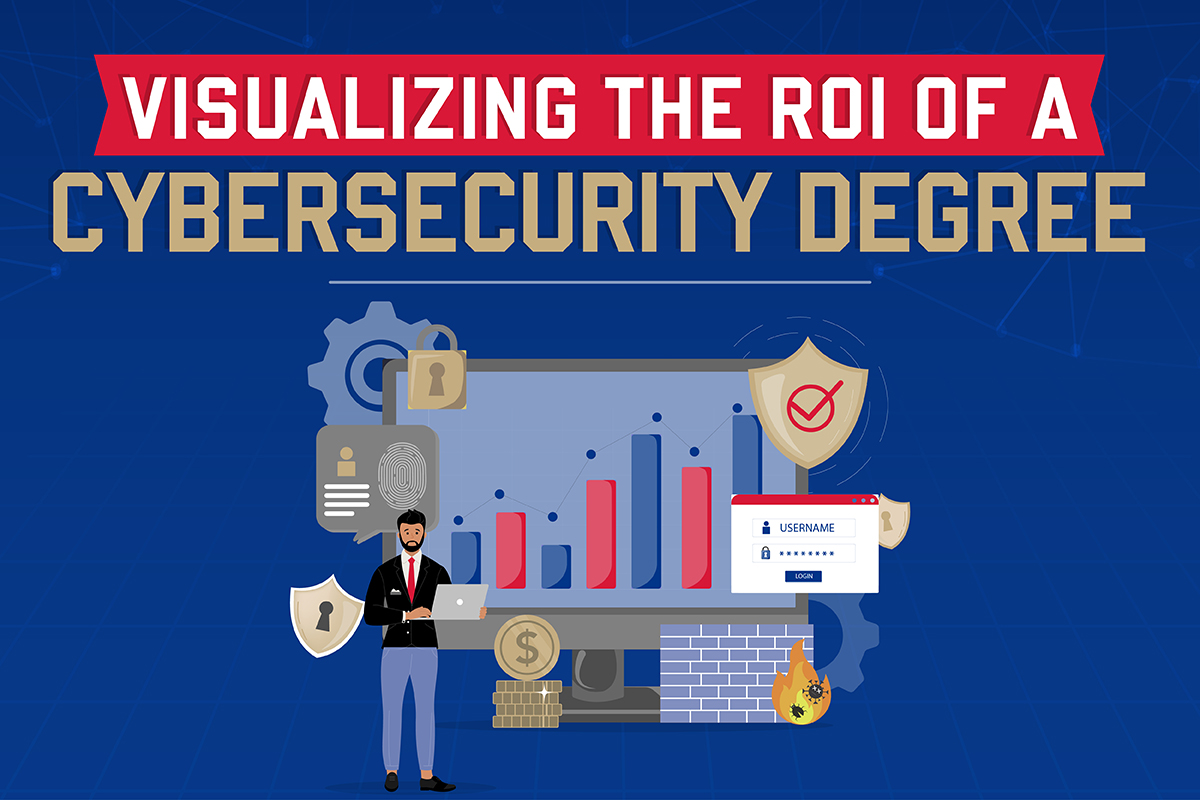What Does a Cybersecurity Engineer Do?
Written by:
University of Tulsa
• Jan 4, 2024

A successful cyber attack can devastate a business. Cybercrime’s global economic impact will reach $10.5 trillion annually by 2025, according to Cybersecurity Ventures. IBM reports that the average cost of a data breach in 2023 is $4.45 million. These figures underscore the need for skilled cybersecurity professionals who can develop and maintain the networks and systems that protect organizations’ vital information from increasingly sophisticated attacks.
Cybersecurity engineers are one of the more prominent professions in the cybersecurity field. Individuals in this role are often the backbone of a company’s information security efforts, keeping the business one step ahead of cybercriminals and protecting its valuable data — not to mention its bottom line. This article will answer some key questions about what a cybersecurity engineer does, what makes their role so important, and what level of education and training they need.
What Is a Cybersecurity Engineer?
Cybersecurity engineers are information security professionals who oversee computer networks, ensuring they meet sufficient security standards. They design, develop, and implement systems that aim to protect their organization and its sensitive data and networks from cyber attacks. In doing so, they act as the organization’s system architect and online security director.
To be effective in their role, cybersecurity engineers rely on their technology skills and their ability to continuously monitor the latest cyber attacks to stay one step ahead of cybercriminals. Tech innovations such as the growing use of artificial intelligence (AI) and cloud computing are providing new avenues for potential attacks. Cybersecurity engineers must develop and maintain systems that consider the connections between cybersecurity and AI, cloud computing, and other progressive tech elements.
A cybersecurity engineer’s work is about digital safety, and this can involve protecting systems beyond internal business systems. For instance, they may help build structural systems that reinforce internet safety within apps created for children. Regardless of the project, their primary goal is to optimize security and protection within a tech-driven setting.
The Duties of a Cybersecurity Engineer
To fully understand what a cybersecurity engineer does, it can be helpful to look at a breakdown of their essential tasks. Cybersecurity engineering tasks include the following:
- Overseeing the maintenance of systems and networks to reaffirm their strength, using tactics like penetration testing and network configuration testing to identify vulnerabilities and weaknesses
- Installing new equipment and developing and executing new systems that directly address vulnerabilities
- Implementing various programs like firewalls, encryption, and intrusion deception systems that can make it easier to identify potential security breaches
Cybersecurity engineering tasks typically involve collaboration with other professionals inside and outside the company. Some of a cybersecurity engineer’s duties involve work not directly related to their company’s systems, such as the following:
- Ensuring systems align with the company’s legal and regulatory requirements and standards
- Developing and implementing emergency protocols for moving or transferring data in the event of a cyber attack
- Working with law enforcement to help track down perpetrators when an attack occurs
How to Become a Cybersecurity Engineer
Because cybersecurity engineers play such a crucial role in protecting their organization’s most sensitive data and systems, the path to becoming one entails gaining the high-level skills and experience needed to succeed in this advanced, complex profession.
Earn a Bachelor’s Degree
Earning an undergraduate degree can help an individual build the foundational knowledge and skills in areas such as computer science, network infrastructures, and data analysis that support a cybersecurity career. This degree can be a bachelor’s in cybersecurity, but it can also be a bachelor’s in a related field, such as information security or computer engineering. Individuals can further expand their skills as they work toward their degree by participating in clubs or groups devoted to computer science.
Obtain Certification
While professional certifications are not required for some cybersecurity roles, earning a professional certification can help individuals validate their expertise in specific aspects of cybersecurity. This can also help individuals further distinguish themselves from other prospective job candidates. Certain certifications have specific requirements, such as passage of an exam or years of work experience.
Gain Experience
Whether they’re working toward a specific certification or not, gaining real-world experience in the cybersecurity field is essential for individuals pursuing a cybersecurity engineering role. This can be achieved by completing a postgraduate internship, which can also provide individuals with networking opportunities that could help grow their careers over time.
Aspiring cybersecurity engineers can also gain experience through entry-level jobs in the cybersecurity field. As they gain experience, individuals need to keep abreast of new and evolving technologies and tactics used in computer science and cybersecurity, such as new programming languages and cybercrime trends.
Earn a Master’s Degree
Pursuing a graduate degree such as a master’s in cybersecurity can deepen an individual’s technical, mathematical, analytical, and creative thinking skills, all of which are required for advanced cybersecurity roles such as cybersecurity engineer. Earning an advanced degree can also open up additional opportunities, as some employers may set a master’s degree as a minimum requirement for open cybersecurity engineer positions.
Become a Key Figure in Data Protection
What a cybersecurity engineer does encompasses the prevention of cyber attacks and so much more. Cybersecurity engineers keep sensitive data and networks safe, save their company money, and protect its reputation. In many firms, cybersecurity engineers and the systems they build and oversee are a fundamental part of the organization’s short-and long-term strategies.
The University of Tulsa’s online Master of Science in Cyber Security program can help you develop the skills and knowledge needed to excel as a cybersecurity engineer. Our program features courses that focus on both the technical and organizational principles of cybersecurity. This combination can train you to approach cybersecurity from both a technical and a business standpoint. Learn how we can help you achieve success in an increasingly important field.
Recommended Readings
8 Reasons Demand for Cybersecurity Professionals Will Keep Rising
The Importance of Cybersecurity Leadership
What Cybersecurity Professionals Really Need to Know About Programming
Sources:
Cybercrime Magazine, “Cybercrime to Cost the World 8 Trillion Annually in 2023”
Fierce Electronics, “IoT Security: How Engineers Must Get Ready for the Crush”
IBM, “Cost of a Data Breach Report 2023”
Indeed, “What Is a Cybersecurity Engineer? (Plus How to Become One)”
Infosec, “How to Become a Security Engineer: Training, Certifications and Resources”
TechTarget, “Top 8 In-Demand Cybersecurity Jobs for 2023 and Beyond”


